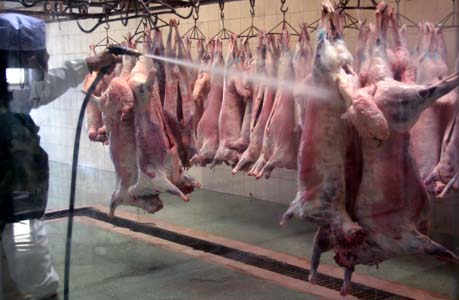 Sheep carcasses at the Laohe Qiao Halal Beef and Mutton Manufacturing Plant, Wuzhong City, Ningxia Hui Autonomous Region.
Sheep carcasses at the Laohe Qiao Halal Beef and Mutton Manufacturing Plant, Wuzhong City, Ningxia Hui Autonomous Region.
There are 1.3 billion Muslims in the world and Ningxia's Halal meatpackers are looking to put food on their dinner plates.
Believing the local Tanyang sheep variety, fed on licorice, alfalfa, and wild herbs, produces the finest mutton in the world, Ningxia's producers are confident they can make major inroads into the 150 billion dollar world Muslim market.
The newly appointed chairman of Ningxia Hui Autonomous Region, Wang Zhengwei, is backing them all the way. More than a third of Ningxia's population are Muslims from the Hui ethnic minority and Wang, himself a Muslim, has pledged to make Ningxia a platform for economic and cultural exchanges between China and Muslim countries.

Meat processing at the Laohe Qiao Halal Beef and Mutton Manufacturing Plant, Wuzhong City, Ningxia Hui Autonomous Region.
Wuzhong City in Ningxia is the site of China's biggest wholesale market for beef and lamb and Laohe Qiao Halal Beef and Mutton Manufacturing Plant, located just 5 km south of Wuzhong, is one of the largest Halal meat producers in the northwest of China. It processes over one million sheep, 80,000 cattle and 10,000 camels per year.
The firm's spokesman told China.org.cn that the firm has an annual turnover of 600 million yuan and is growing at a rate of 10 percent per year. It has established export markets in Jordan and the United Arab Emirates.
Laohe Qiao is a private company and has received no government investment. It employs over 2000 local people, 95 percent of whom are Muslims from the Hui ethnic group.
The appreciation of the Renminbi against the dollar and other currencies has hurt Chinese exporters and food producers have suffered more than most as the price of meat has soared by 50 percent in the past year. But Laohe Qiao's spokesman said that its exports were holding steady in the face of these difficulties.
(China.org.cn by John Sexton and Pang Li, July 21, 2008)